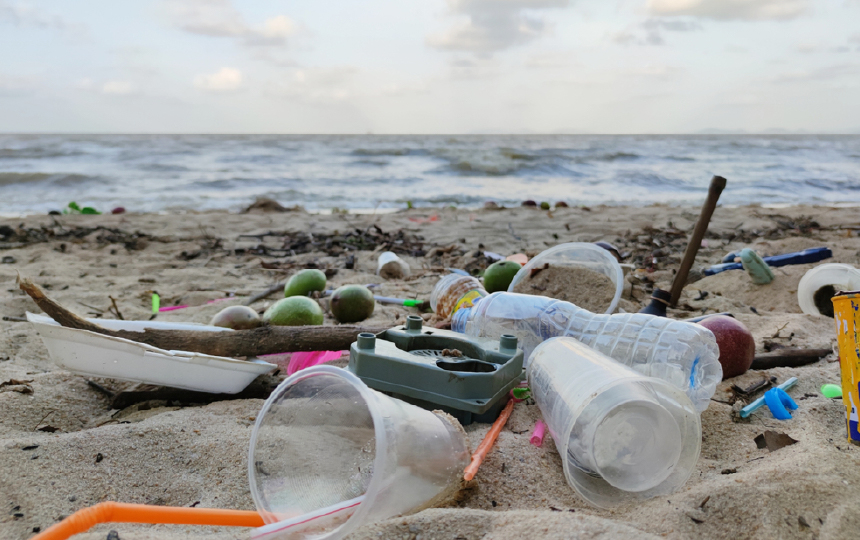
10 Simple ways you can cut down on plastic waste
91% of plastic isn't recycled, and everything you've ever owned will one day become waste. However, our fuss-free infographic lists 10 ways you can cut your plastic usage down.
More +Disposable vapes are a huge problem in the modern world, yet few people are aware of their potential dangers. In this blog, we will explore the harm disposable vapes can have on society and the environment and why we were 1 of 16 organisations writing to the government to call for a ban.

A call to ban disposable vapes has been making headlines in recent months as more and more people are becoming aware of the environmental harm that they can cause. Disposable vapes are small, single-use devices that deliver nicotine or other chemical compounds when heated. These products are becoming increasingly popular, but unfortunately, they are not great for the environment.
As the e-cigarette industry has grown, so has the number of disposable vape products on the market.
Marketing
The marketing tactics used to promote disposable vapes have come under heavy criticism, as it has been suggested that the use of bright colours and the range of flavours appeal to young people. Further Studies show that instead of helping existing smokers to give up the habit, they are creating a whole new generation hooked on nicotine, and therefore undermining decades of work that has been done to reduce smoking and reach the goal of becoming smoke-free by 2030.
Potential health risks
While the long-term effects of vaping are not yet fully understood, there is evidence to suggest an increased risk of chronic lung conditions, such as bronchitis and asthma. This is caused by exposure to certain chemicals used in the production of disposable vapes, which are released when the device is heated up for inhalation. The counter-arguments made about vaping overall is that it’s better than smoking – so we should therefore accept the potential ‘lower’ risk of vaping in comparison to cigarette smoking.
Environmental Impact
The environmental impact of disposable vapes is far-reaching and significant. Not only does the manufacturing process cause pollution from the production of plastic, but these single-use vapes are also non-biodegradable, which means that once thrown away, the plastic will take hundreds, if not thousands of years to decompose. On top of this, the lithium contained in these devices can be toxic if released into the environment. To put this into perspective, Material Focus conducted research and found that each single-use vape contains on average 0.15g of lithium and with over 1.3 million single-use vapes thrown away every week this accumulates to 10 tonnes of lithium a year, equivalent to the lithium in batteries inside 1,200 electric vehicles.
If action is not taken soon, this crisis has the potential to create a damaging cycle of plastic waste, that will lead to the contamination of our environment for generations to come.

Why we signed the petition to ban single-use vapes
Given these health and environmental risks associated with disposable vapes, Social Change joined 15 other environmental and health organisations in writing to the environment secretary and health secretary to call for action on this “rapidly escalating threat”. The petition made a number of recommendations to help the UK move towards a smoke-free society by 2030, including banning the sale of single-use e-cigarettes, restricting the sale of reusable ones, and introducing stricter regulations on advertising. If implemented, these measures could help reduce smoking prevalence across the nation over time and help us reach our goal of being smoke-free by 2030. It would also protect our environment from additional littering caused by disposable vapes. Ultimately, we hope that our efforts will result in more responsible vaping practices that better benefit both our physical and mental health, as well as the planet.
It is clear that disposable vapes present numerous dangers to both humans and the environment. It is essential that we become more aware of the risks associated with these devices and take action to reduce their impact on our planet.

91% of plastic isn't recycled, and everything you've ever owned will one day become waste. However, our fuss-free infographic lists 10 ways you can cut your plastic usage down.
More +
We discover why the word 'sustainable' is being used more and more and how it's impacting our shopping and eating habits.
More +
We’re working towards a world free of plastic waste, and you can help with these small steps on the road to becoming plastic-free.
More +Enter your email address below to access the Academy and our Webinars